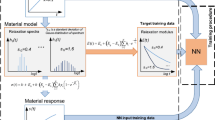Abstract
Realizing the fact that the performance of a finite element (FE) analysis depends on the type of elements, mesh topology, mesh density, node numbering and others, an attempt is made in the present work, to develop a neural networkbased expert system to predict stress analysis results of an FEM package, within a reasonable accuracy. A rubber cylinder is compressed diametrically between two plates, whose induced stresses and deformed shape are to be determined using an FE analysis. By varying two parameters, namely element size and shape ratio, results (obtained through FE analysis) in terms of induced stress and deformed shape of the cylinder are recorded, which are utilized to train a neural network (NN)-based expert system, by using a back-propagation algorithm and a genetic algorithm, separately. Results of two NN-based expert systems are compared, in terms of accuracy in prediction of the results. It is interesting to note that the expert system can predict the results within a fraction of a second, whereas an actual FE analysis may take several seconds depending on the complexity of the problem.
Access this chapter
Tax calculation will be finalised at checkout
Purchases are for personal use only
Preview
Unable to display preview. Download preview PDF.
Similar content being viewed by others
References
Umar A, Abbas H (1996), Prediction of error in finite element results, Computers and Structures, 60: 471–480.
Kittur M G, Houstan R L (1990), Finite element mesh refinement criteria for stress analysis, Computers and Structures, 34: 251–255.
Manevitz L M, Givoli D (2003), Towards automating the finite element method: A test bed for soft computing, Applied Soft Computing, 3: 37–51.
Rank E, Babuska I (1987), An expert system for the optimal mesh design in the hp-version of the finite element method, International Journal for Numerical Methods in Engineering, 24: 657–682.
Manevitz L M, Malik Y (1997), Finite element mesh generation using selforganizing neural networks, Microcomputers in Civil Engineering, 12: 233.
Porto V W (1995), Alternative neural network training methods, IEEE Expert: Intelligent Systems and Their Applications, 22: 16–22.
ANSYS 7.0 Verification Manual, Vol. 6.
Khandia Y A (1990), Finite element analysis of rubber problems, IOP Short Meetings of the Stress Analysis Group of the Institute of Physics — London, 24: 11–31.
Haykin S (2001), Neural Networks Pearson Education (Singapore) Pvt. Ltd., New Delhi, India.
Goldberg D E (1989), Genetic algorithms in search, optimization, and machine learning, Addison-Wesley, Reading, Mass., USA.
Author information
Authors and Affiliations
Editor information
Editors and Affiliations
Rights and permissions
Copyright information
© 2006 Springer-Verlag Berlin Heidelberg
About this paper
Cite this paper
Bhise, O.P., Pratihar, D.K. (2006). Neural Network-Based Expert System to Predict the Results of Finite Element Analysis. In: Tiwari, A., Roy, R., Knowles, J., Avineri, E., Dahal, K. (eds) Applications of Soft Computing. Advances in Intelligent and Soft Computing, vol 36. Springer, Berlin, Heidelberg. https://doi.org/10.1007/978-3-540-36266-1_22
Download citation
DOI: https://doi.org/10.1007/978-3-540-36266-1_22
Publisher Name: Springer, Berlin, Heidelberg
Print ISBN: 978-3-540-29123-7
Online ISBN: 978-3-540-36266-1
eBook Packages: EngineeringEngineering (R0)




